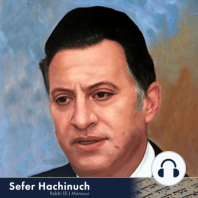20 min listen
Misva #91: Bikkurim (First Fruits)
FromSefer Hachinuch
ratings:
Length:
20 minutes
Released:
Dec 9, 2021
Format:
Podcast episode
Description
The Torah commands in Parashat Mishpatim (Shemot 23:19), “Reshit Bikkureh Admatecha Tabi Bet Hashem Elokecha” – requiring one to bring to the Bet Ha’mikdash his first fruits that ripen, which are called “Bikkurim.” Tradition teaches that this Misva applies only to the “Shibat Ha’minim” – the seven species for which the Land of Israel is praised (in Debarim 8:8). These are wheat, barley, grapes, figs, pomegranates, olives and dates. The Sefer Ha’hinuch writes that the Sages arrived at this conclusion based on the simple fact that the Torah never makes mention of any other fruits that grow in the Land of Israel. If the Torah here states simply that one must bring the first “fruit of the land” to the Bet Ha’mikdash, it stands to reason that this refers to the fruits mentioned elsewhere, namely, the seven species. The Seforno (Rav Ovadia Seforno, Italy, d. 1550), commenting on this verse, suggests a different explanation. He writes that this verse, at first glance, seems redundant. The words “Bikkureh Admatecha” mean “the first fruits of your land,” such that the word “Reshit” (“first”), seemingly, is superfluous. Necessarily, Seforno writes, the word “Reshit” in this verse means not “first,” but rather “choicest.” The Torah requires bringing to the Bet Ha’mikdash the first of the best species of fruits in Eretz Yisrael – referring to the seven special species. The reason underlying this Misva, the Sefer Ha’hinuch writes, is that it helps remind us that Hashem is the source of all blessings in the world. When a farmer receives his produce, he takes a portion and gives it to G-d, as it were, acknowledging that it is G-d who blessed him with his fruit. This recognition will then help ensure his continued blessing and prosperity. The fruits brought as Bikkurim would be distributed among the Kohanim serving that week in the Bet Ha’mikdash. The fruits needed to be presented in a utensil; one could not simply bring the fruits by themselves. And, the Bikkurim needed to be presented “Derech Noi” – in an aesthetically pleasing manner. The farmer would thus decorate the baskets. The farmers bringing their Bikkurim would march in a procession through the streets of Jerusalem on their way to the Bet Ha’mikdash, and the shopkeepers would leave their stores to greet the farmers and sing for them. The Misva applies only in the times of the Bet Ha’mikdash, and is binding only upon males. The Torah obligation of Bikkurim is limited to the Land of Israel. However, the Sages enacted that Bikkurim must be brought also from the fruits of “Suria” – certain regions in Syria captured by King David – as well as the fruits of Eber Ha’yarden (Transjordan, the region inhabited by the tribes of Reuben and Gad). As mentioned, the Misva of Bikkurim applies to the seven special species, which include wheat and barley. There is a debate among the Aharonim as to whether it applies also to the other three principal grains – rye, oats and spelt. These species are generally grouped together with wheat and barley, such as with regard to the laws of Berachot: products made from any of these grains require “Ha’mosi” and Birkat Ha’mazon. Accordingly, the Maharsha (Rav Shmuel Eidels, 1555-1631), in Masechet Pesahim (36), writes that with regard to Bikkurim, too, these grains are treated like wheat and barley, and are included in the Bikkurim obligation. By contrast, the Minhat Hinuch cites the Peneh Yehoshua (Rav Yaakob Yehoshua Falk, Germany, 1680-1756) as contending that these three grains do not fall under the category of “Reshit” – the choice species of the Land of Israel, and therefore are not included in the Misva of Bikkurim. Nowadays, of course, in the absence of the Bet Ha’mikdash, we cannot fulfill the Misva of Bikkurim. Nevertheless, the idea behind this Misva is no less relevant today, and it is thus appropriate whenever we receive money or assets to allocate a portion to G-d through a donation to charity or for the support of Torah scholars to show that we re
Released:
Dec 9, 2021
Format:
Podcast episode
Titles in the series (100)
Misva #19: The Prohibition Against Eating Hametz on Pesach: Daily Sefer Hachinuch - Brought to you by itorah.com by Sefer Hachinuch
